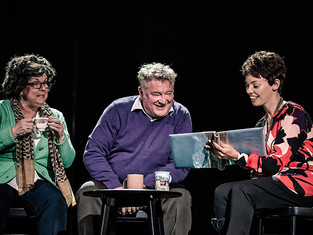Red Dust Road
- Jeffrey Wainwright

- Sep 13, 2019
- 2 min read
Updated: Sep 18, 2019
Jackie Kay; adapted for the stage by Tanika Gupta
HOME Manchester and the National Theatre of Scotland
HOME Manchester
12-21 September 2019; 2hr 30min


Red Dust Road is a stage adaptation of Jackie Kay's "autobiographical journey", published in 2011.
The conventional demands of autobiography are that it be truthful and complete, which might present problems for the necessary artifice of the theatre. There are important aspects of Jackie's life only glanced at here – her teenage rebelliousness, her son – but the story as told is rich, remarkable and full enough.
Jackie is the daughter of a young woman from the Scottish Highlands, Elizabeth, and a Nigerian student, Jonathan. There are different versions of the nature of their brief relationship but in the event Jackie was given up for adoption and taken in by a generous Glaswegian couple, Helen and John Kay – genial Communists to the core.
The play, in which Jackie (Sasha Frost) features throughout, follows her quest for identity through a childhood marked by racism, the discovery of her lesbianism, the effort to discover and relate to her birth mother and the meeting in Nigeria with her biological father. It is a tortuous and complex process, though one featuring surprisingly little angst, thanks mainly to the positiveness of her adoptive parents.
Helen and John (Elaine C Smith and Lewis Howden) provide not only sound attitudes in defence of their daughter from casual racism, but a cheerful culture that ranges between Cole Porter's Brush Up Your Shakespeare and an address to the haggis. The performances of Smith and Howden have the warmth of a drop of good Scotch, and their affection is often moving.
For all her appreciation of her good fortune in her parents, Jackie still needs to fill out her whole identity. As a kind of prelude, Tanika Gupta has already shown us the first encounter between Jackie and her Nigerian father. He turns out to be no longer the clubbing Romeo of his youth but a born-again Christian preacher, whose holy-rolling is given full extravagance by Stefan Adegbola.
Here though is the piece's one uncomfortable note. The demons that now drive Jonathan to reject his unacknowledged lesbian daughter are seen as quite different from those benevolent spirits invoked to welcome Jackie into her Nigerian community by the local matriarch. The opposition is dramatically just too pat, however autobiographically true it may be.
But it is in the life of Elizabeth that we see the cruel inequities of patriarchal culture. Jackie finds her birth mother to be a dessicated exile in Milton Keynes, eventually sliding slowly into a dementia stuck with Post-it notes.
Irene Allan gives a subtle, moving performance as Elizabeth both in middle and old age, culminating in a wonderfully affecting rendition of Burns' Ye Banks and Braes O' Bonnie Doon, the high point of a varied and skilful sound design by Richard Hammarton and composer Tayo Akinbode.
But this is mainly a cheerful and warm-hearted show, ingeniously directed by Dawn Walton and led by Sasha Frost, whose engaging vivacity gives us an irrepressible Jackie.
It is rare to encounter a show so serious in its themes and so optimistic in its temper.
#RedDustRoad #JackieKay #homemcr @ntsonline











